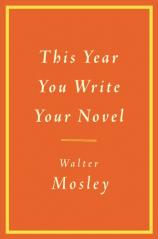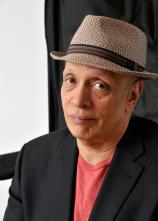This Year You Write Your Novel
Review
This Year You Write Your Novel
In THIS YEAR YOU WRITE YOUR NOVEL, Walter Mosley attempts to tell readers "everything I know about novel writing in less than 25,000 words." He succeeds brilliantly in this valuable little book that should take its place alongside THE ELEMENTS OF STYLE and ON WRITING WELL on the bookshelf of any aspiring writer and those interested in how novels are put together.
Mosley is the author of 27 books, including 10 in the acclaimed Easy Rawlins private detective series. But he also has tackled literary fiction in books like RL'S DREAM and THE MAN IN MY BASEMENT, as well as science fiction and nonfiction books about politics and current events.
Writing is first and foremost a craft. It's not an art, although great writers like Mosley can raise it to an art form. As a craft, writing has certain rules specific to each genre that must be followed and practiced over and over again by all writers. This book deals with the novel-writing process and provides a quick rundown of the essential tools that any aspiring novelist will need.
But this is more than just a guidebook. Anybody who has worked as a professional writer long enough is familiar with the conversation with a stranger that usually begins by them saying, "I have a great idea for a novel…" And the professional writer listens respectfully and nods sympathetically. But in the back of our minds we know that rarely, if ever, will that person write an actual book.
Despite popular misconceptions, writing a book is not just something you can sit down and bang out "one of these days when I get the time." The great newspaper columnist Red Smith once said, "Writing is easy. You sit down at a typewriter and cut open a vein."
Mosley understands this and knows that writing is more than a great idea for a story. Writing requires discipline. And writers write. It's as simple and complicated as that. Mosley says here, "The only thing that matters is that you write, write, write. It doesn't have to be good writing. As a matter of fact, most first drafts are pretty bad. What matters is that you get down the words on the page or the screen…"
Mosley suggests writing 600-1,200 words a day, seven days a week, and spending at least an hour or an hour-and-a-half each day writing or editing. He correctly points out that by doing this you will have the first draft of a 60,000-word book done in three months.
Writing is a craft, and the only way you master a craft --- whether it's making shoes or hitting a major league curveball --- is to do it over and over and over again. Even Hall of Fame hitters took batting practice everyday.
Mosley points out another key thing: writing a novel is linked to your unconscious. "The most important thing I've found about writing is that it is primarily an unconscious activity…The connections, moods, metaphors, and experiences that you call up while writing will come from a place deep inside you. Sometimes you will wonder who wrote those words."
That is the magic of the writing process. Anybody who has ever written a novel knows that part of the joy of writing is discovery. Your characters always surprise you, even though you are the one who created them and know their destinies. And after a while, if you are really in the zone of your story, you start looking forward to seeing what your characters will do and say today, as if they were old friends stopping by for a visit. If you can be surprised, delighted or shocked, so too will the reader.
Mosley spells out the essential elements of how to write fiction, from the narrative structure you choose to the difference between the story and the plot to the development of character and multiple characters' arcs. He writes about the vital importance of learning to edit your words and seeking the music in your prose. Like a patient doctor, Mosley breaks the novel down and shows us what the X-rays mean in a short and easily understandable style.
This is a wise book. Mosley writes, "What you must always remember is that the novel is more experiential than it is informational. Your reader might learn something, but most of what they learn is gained through what they are shown about the lives and circumstances of the characters therein."
And like the good doctor, Mosley does not sugarcoat the writing life or promise you a bestseller. "Writing in America can be a lonely experience. It is not a revered occupation (unless you write the script for some blockbuster movie). Most Americans are not interested in the unpublished writer."
And here he addresses the biggest misconception about the writing life: that you just get the words down and the world will beat a path to your printer and you'll be on easy street.
Mosley says, "At this moment in my career, after publishing twenty-seven books and at least as many short stories, I still get rejected on a regular basis. Recently I wrote a story that every major magazine rejected. After going to the major presses, I went to the smaller ones. Nobody will publish it --- nobody. So don't despair --- accepting rejection is part of the job description."
In THIS YEAR YOU WRITE YOUR NOVEL, Mosley does what every great writer does: he tells the truth. And that truth is best summed up in this sentence: "Greatness lies in the heart of the writer, not in technique." Sure it's a tough business. It's even tougher today in the age of corporate media that demands instant success. But it's that shot at greatness and the sheer joy it brings that make people write novels.
For them, and for anybody interested in the writing process, this is an indispensable, hopeful book. Be prepared to take notes and read it multiple times.
Reviewed by Tom Callahan on April 3, 2007
This Year You Write Your Novel
- Publication Date: April 3, 2007
- Genres: Nonfiction, Reference
- Hardcover: 112 pages
- Publisher: Little, Brown and Company
- ISBN-10: 0316065412
- ISBN-13: 9780316065412





